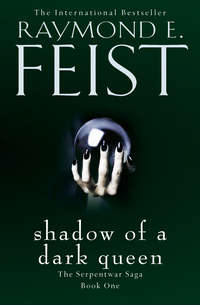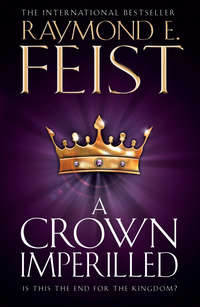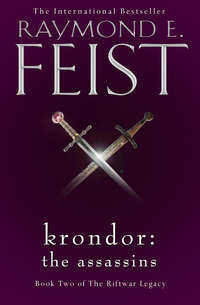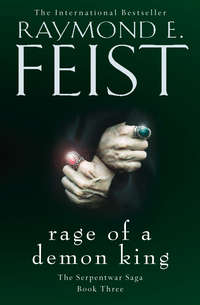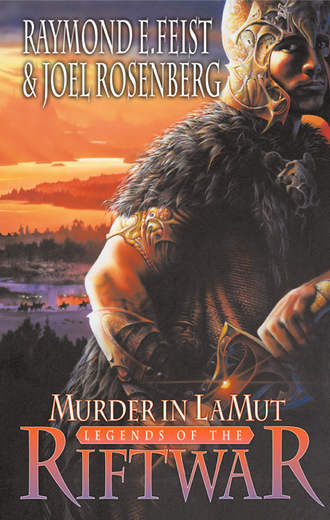
Полная версия
Murder in Lamut
Kethol had no idea what this fight was about, but grunts quickly turned into shouts and shouts were followed by the meaty thunk of blows landing.
He saw something out of the corner of his eye, and ducked quickly enough to avoid the flying chair, but the motion brought him into full contact with the burly regular on his right, and instinctively the Mut responded with a backhanded fist that caught Kethol high on the right cheekbone.
Lights went off in Kethol’s right eye, but reflexes worked where vision couldn’t; he lowered his head and lunged, catching the Mut around the waist in a tackle that brought both of them to the hard wooden floor. Kethol landed on top, hoping he had knocked the wind out of the other. He bashed his fist into the soldier’s midsection, just below the ribcage, for a bit of insurance. Hope was a fine thing, but certainty was better. He had nothing personal against the man he was fighting, but he was used to killing people he had nothing against, so just roughing up one didn’t count. Then he slammed his knee into the other man’s groin and rolled away. This brawl was a matter of self-protection, not anger.
That was the thing about other people that Kethol never had understood: other people – even Pirojil and Durine – often got angry during a fight, letting their anger fuel them. For Kethol, it was all a matter of doing what you needed to. You got angry over other things – cruelty, or cheating, or incompetence or waste – not combat.
A few miscellaneous blows landed on his back and legs as he rose to a crouch – the wildly flailing feet of two other combatants as they rolled about the ground – but they didn’t slow him down, and at least no knives or swords had come out, not yet. It was just a tavern fight, after all, and it was unlikely that, even drunk, the soldiers would escalate it into something more.
Off in the distance, somebody was ringing an alarm bell frantically. Most likely the tavernkeeper, calling for the Watch, for the alarm bell was quickly echoed by the Watch whistles. Clearly the Watch had been nearby, supplemented by a squad of regulars assigned from the garrison for the purpose of keeping order in the city. The Earl of LaMut might be young and new to his position, but it would be no surprise to him or his captains that garrisoned soldiers tended to fight with each other when they couldn’t find anything else to do, and the best of the Kingdom nobility were used to accepting and dealing with the inevitable.
Neither was it a surprise to Kethol; he was always half-expecting a fight to break out, and while he hadn’t been counting on it, he had been hoping for it.
He made his move.
In a fight, a man being knocked down was nothing to be surprised about, so as he grunted and fell to the floor, nobody would take particular notice that his fall hadn’t been preceded by a blow. The fact that he fell to the floor where under a table several dozen of the coins had scattered was simply a matter of convenience.
He quickly scooped up a handful of coins – not worrying about the sound of clinking metal carrying over the shouts and grunts; everybody else would be too busy to notice a small thing like that – and made certain to pick out the silver reals first, before bothering with the coppers. All of the coins went into a hidden pocket sewn into the inside of his tunic, and he stuffed a rag in on top of them before pulling the pocket’s drawstring tight.
Then he was on his hands and knees, making for the door as quickly as he could: he had already taken his pay for this fight, and it was time to be going.
A tavern fight had a dynamic of its own: after a few moments of free-for-all, some men would be down, hurting; others would have paired off, working off new or old grievances of their own with their fists.
Yet others would soon be doing what Kethol was busy doing: not hanging around for the fight to turn bloody, and particularly not waiting for the arrival of the Watch, but making themselves scarce. Unsurprisingly, that Milo fellow had been the first man through the door and out into the night, and others had followed. Kethol wouldn’t be the first, or the last, and that was just fine.
Kethol launched himself through into the mud-room and through the mud-room to the entryway, brushing aside the thick sheets of canvas hung up to keep the chill air out of the tavern.
And stopped in his tracks.
They were waiting for him outside: a squad of regulars, led by a mounted corporal whose massive dark horse pranced nervously on the hard-packed snow, pawing at it with the strange clawed horseshoes that Kethol hadn’t seen anywhere except in LaMut.
A lance pointed in his direction.
‘You’d be Kethol, the mercenary,’ came a voice out of the darkness.
There was a sharp point on the lance, and no point in denying it. If there was a problem, he would have to talk his way out of it now – or, more likely, think, talk, or fight his way out of it later.
‘Yes,’ he said, his hands spread in a question. ‘Is there some problem?’
‘Not for me. The Swordmaster wants to see you.’
‘Me?’
‘You. All three of you.’
He didn’t have to ask what the corporal meant by ‘all three of you’.
‘So let’s be on our way,’ the corporal said.
Kethol shrugged.
With the stolen coins warm in his hidden pocket, he had nothing else that he needed to be doing, including dying in the street.
At the moment.
It was a dark and stormy night, and if there was such a thing as a barn that wasn’t draughty, Pirojil had never seen one, so he wasn’t surprised at the bitter cold ripping through the place as he rolled another bale of hay down from the loft, letting it fall onto the hard-packed earth below.
The horses were used to the thunk made by the bale hitting the floor, although the big bay gelding that was reserved for the use of the Horsemaster himself nickered and clomped in his stall.
Pirojil didn’t have any particular objection to doing his share of tending the horses – all of the stableboys had been pressed into service as message runners during the last-but-one battle, and all of them had been cut down either by Tsurani or Bugs – but he didn’t particularly care to be doing it in a barn that was so cold and draughty that the sweat on his nose kept freezing.
It was a trade-off, as most things in life were. The less you complained about having to muck out a few stalls, the more likely it was that your name was not going to come to the top of the captain’s mental list when he needed to send a patrol out to see if there really were Tsurani lying in ambush in the forest ahead. And if you could improve the job with more than a few swigs from a bottle of cheap Tyr-Sog wine that the late sergeant – may Tith-Onaka, god of soldiers, clasp him to his hairy, hoary breast! – didn’t have any use for any more, well, then what was the harm?
It was lousy work, but it was easy.
You just slid a hackamore on the horse, led it to an empty stall, being sure to close the animal in properly, and then forked out the old, shit-and-piss-laden straw, then spread out some of the fresh. The old straw went into the wheelbarrow, and the wheelbarrow went up the ramp and through two sets of heavy swinging doors, to be dumped onto the back of the midden wagon, after which it was no longer Pirojil’s problem. Somebody else would have to haul it out of town, and dump it. It was said that the dung of LaMut horses was why the local potatoes grew as big as horseflops, but growing vegetables was something that Pirojil didn’t know much about.
Or care.
Pirojil knew that he was capable of being as complex a man as there was, which was why at times very simple things appealed to him. As did not thinking about things that didn’t concern him. There was no point in employing his mental capacity without a good reason, after all. He had another swig of wine, gargled with it to clear the accumulated phlegm from his throat, and carefully re-stoppered the bottle before setting it down on the floor next to the ladder. The ladder could be used for getting down to the floor, but there was also the rope. And, just a short step away from the loft, a well-varnished pole stood invitingly.
Pirojil slid down the pole easily, his thick leather gloves warming only a trifle from the friction, and landed lightly. That was the trick of it, he had decided. You wanted to stop just at the floor, by your own friction, not drive your boots into the hard earthen floor.
It was a silly thing to be concentrating on, but there were worse.
Like the way women looked at him. Even the whores.
He shrugged. An ugly man was an ugly man, but an ugly rich man was a rich man, and some day he would be at least a moderately rich man, if he wasn’t a dead man first. You had to keep building up your stake, and waiting for the right moment, and in the meantime –
In the meantime, you could amuse yourself with daydreams about wealth, while you waited for the predestined spear to run you through the belly, the fated sword to find your heart, or the inevitable arrow to seek your eye.
Willem, the last of the stableboys, had gone to war with his father’s shield, and come back upon it. In his memory, the shield had been hung on the wall of the stable with the rest, and polished to a ridiculously high gloss by somebody who should have found something better to do with his time.
Thankfully, though, even as highly polished as the shield was, he couldn’t see his reflection in it. He had no particular need to see the misshapen forehead hung heavy with bushy eyebrows, over sunken, tired eyes, and a nose that had been broken enough times to flatten it against the face, and turn him into a mouth-breather.
Pirojil fingered the scraggly beard that covered his jaw. It never did fill in, and he never would permit it to grow long enough for an enemy to grasp.
You couldn’t always tell about people by looking at them. There were ugly people in this world, but many of them were good and kind. Pirojil had long ago decided that his own face was a mirror to his soul. It took something other than a gentle soul to decide to make most of your living sliding a sword into another man’s guts, and the rest of it waiting to slide a sword into another man’s, or any of the hundred other different ways of killing Pirojil had used to earn his pay.
A skritching sound sent his hand to his belt as he spun about.
He forced himself to relax. Just a rat, off in a corner up against the oat bin.
An ongoing problem, and one you’d think that the magicians would take time out of their busy schedule to handle. Couldn’t they … wiggle their fingers or mutter their spells or whatever they did and keep the rats out of the horses’ oats and carrots and corn? Well, it was none of his business. He wasn’t sleeping in the cold stable, and, besides, nobody was paying him to kill rats.
Something whipped past his ear and thunked into the wood of the oat bin, accompanied by a short squeal.
‘Got it.’ A tall, rangy man stepped out of the shadows, tucking a second knife into a sheath on his right hip. A basket-hilted rapier hung from his belt – the narrow, precise weapon of a duel-list, not the broader, longer sword that a line soldier would carry into battle. Tom Garnett chose his weapons with care.
It didn’t much matter that Pirojil’s own sword was a good six paces away, hung on a hook while he worked. Captain Tom Garnett, the oldest of the captains fealty-bound to his excellency the Earl of LaMut, was, even in his late forties, a far better swordsman than Pirojil could ever hope to be. Whether it was the result of innate talent or more than thirty years of spending half his waking hours with a sword in his hand – or, most likely, both – in a swordfight, Garnett could easily have carved Pirojil into little pieces.
And, apparently, he had a way with throwing knives, too, although Pirojil would have thought better of him, for Pirojil had never heard of a thrown knife actually killing anybody, and it was absolutely silly to spend the gold to acquire a properly balanced throwing knife.
Pointless, really.
So Pirojil kept his hands from straying near where his own throwing knife was concealed under the hem of his tunic. Yet although he had never heard of a thrown knife actually killing anyone, he had seen one distract a man long enough for him to be killed some other way, and besides, there was always a first time; he just refused to pay enough gold for a good one, and even if he had, he wouldn’t have risked it dispatching vermin. Letting his thoughts run, Pirojil stood silently as Tom Garnett walked over and retrieved the knife, displaying the rat that he had neatly skewered.
It was already limp and unmoving in death; Tom Garnett flicked its body off his knife and into the wheelbarrow with the straw and shit, then stooped to pick up a handful of fresh straw to clean his knife with before replacing it in his sheath.
He stood a head taller than Pirojil, who himself was of more than average height, but while Pirojil was built almost as thickly and solidly as Durine, Tom Garnett was even more rangy and gaunt than Kethol. His hair was coal-black, sprinkled with silver highlights, and except for a thin moustache and tiny, pointed goatee, his face was clean-shaven, revealing a wealth of scars about his cheeks and forehead. You would expect such a tall and gangly man to seem awkward in motion, but he moved like a dancer, seemingly always in balance.
‘I seem to have taken you by surprise,’ the Captain said, making a tsking sound with his teeth. ‘I would have thought better of you, Pirojil.’
Pirojil ducked his head. ‘The Captain is kind to remember me,’ he said.
‘And unkind to criticize? Ah. That could be.’ Garnett gestured at the rat. ‘You object to me killing a rat?’
Pirojil shook his head. ‘Not at all, Captain,’ he said. ‘I might have done it myself.’ He shrugged.
‘If you’d cared to.’ The Captain’s tone was ever-so-slightly mocking.
‘If I’d cared to.’
‘And why didn’t you care to, Pirojil?’ Garnett asked, perhaps too gently.
Pirojil shrugged again. ‘I didn’t see any point. You kill one rat, there’s another score of them where it came from. It wasn’t bothering me, and I don’t remember being ordered – or paid – to hunt rats.’ He leaned on his pitchfork. ‘Do you want to pay me to hunt rats, Captain?’
Tom Garnett shook his head, slowly. ‘Not me, Pirojil. The Swordmaster, on the other hand, may have some rats for you to hunt, or at least to watch out for. I’ve sent for your companions; they should be at the Aerie by now. Would you very much mind coming with me?’ he asked, politely, as though it was simply a request.
Pirojil shook his head. ‘Not at all,’ he lied. He didn’t really have a choice.
Tom Garnett smiled. ‘Relaxing to the inevitable is always wise, Pirojil.’
‘That wasn’t what you said when we were almost overrun by the Bugs, Captain,’ Pirojil said. ‘I seem to recall you shouting something about how we were going to die, but die like soldiers. Is my memory mistaken?’
Tom Garnett grinned. It wasn’t a pleasant smile, being reminiscent of a wolf baring its teeth. ‘Since we weren’t overrun, it wasn’t inevitable, now was it?’
The Captain turned, not waiting for a reply, expecting Pirojil to follow.
Pirojil elected to accommodate the Captain’s expectations and silently trailed him out of the barn.
Glancing through the open gate on the other side of the marshalling yard, Pirojil caught a brief glimpse of lights from the buildings lining the road down the hill into the city proper, and considered the wisdom of building the castle on the bluff overlooking the original city. It was a fine defensive position, as long as you didn’t have to run up and down the hill in this miserable weather. Then again, he considered, those who design castles are not usually the ones sent up and down the road in the middle of a storm. That was just the sort of task set aside for people like Pirojil, Durine and Kethol.
Damn. Now he wished he hadn’t said anything about that Bug attack. Putting aside his own musing, he trudged after the Captain.
• Chapter Two •
Concerns
VANDROS NOTICED SOMETHING.
A hint of Lady Mondegreen’s scent of patchouli and myrrh still hung in the air of the Aerie, although probably nobody else would have been able to detect it over the sulphuric stink of the breath of Fantus, the green firedrake, who had just belched with satisfaction after arriving from his evening meal in the kitchen below.
The Earl of LaMut and his swordmaster exchanged glances as the creature settled in before the fire. The Swordmaster hadn’t been amused by the firedrake’s presence, and even less so by the fact that Fantus had selected the Aerie as his residence-of-choice, probably for its ease of access through the old Falconer’s roost.
Vandros was still uncertain how the creature contrived to get the door open between the Swordmaster’s quarters and the loft above where previous rulers of LaMut had housed their hunting birds for decades. It now held what Steven Argent thought was a thoroughly inadequate assortment of messenger pigeons, under the care of Haskell, the pigeon breeder, to whom Steven Argent sarcastically referred as ‘the Birdmaster’ – although not in Vandros’s direct hearing.
Haskell was supposed to keep the firedrake up in the loft, but the only doors he was careful about locking were the doors to his charges’ cages, each one labelled ‘Mondegreen Keep’ or ‘Yabon’ or ‘Crydee’ or wherever the occupant bird’s raising and instinct would cause it to return to when released; Haskell was much less reliable when it came to the door to the loft.
Even when Swordmaster Steven Argent himself bolted the door, the drake managed to get down the narrow stone steps and gain entrance to the Swordmaster’s bedchamber. But in the last few days Argent had apparently resigned himself to the creature being his lodger until the Duke of Crydee returned from his council up in the City of Yabon and collected the drake in the spring.
Fantus sighed in obvious satisfaction, extending its long, serpentlike neck, and let its chin rest on the warm stones before the hearth. Large wings folded gracefully across its back, the reflecting flames gave crimson and gold accents to the green scales of its body.
The firedrake had arrived a week earlier with Lord Borric’s court magician, Kulgan, and when the Duke of Crydee and his entourage had departed two days before for the general staff meeting at Duke Brucal’s castle in Yabon City, Fantus had stayed behind.
No one was quite sure what to do about it; most of the staff and household were too frightened by the small dragonlike creature to do more than get out of its way on its daily forays to the kitchen for food; though a few, like the Earl, were amused by it.
If Vandros was put off by the smell, he was discreet enough not to say a word about it, and neither did the habitually glum servitor who placed a tray down on the table and then poured each of them a glass of wine before setting the bottle back on the tray.
‘Is there anything else required, Swordmaster?’ Ereven asked Steven Argent instead of Vandros – and quite properly so, for while Vandros outranked the Swordmaster, and the entire castle was his residence, as the Earl of LaMut, the Aerie was the Swordmaster’s quarters, and the housecarl was officially helping Steven Argent, as host, entertain the young Earl, it being the host’s duty to see to the comfort of his guest.
Steven Argent smiled his appreciation to the servitor; the Swordmaster appreciated the fine points of hospitality, as well as of any other craft.
‘Nothing at all, thank you, Ereven,’ he said, after a quick nod from Vandros. ‘Consider your service over for the evening, and do give my best to Becka and to your daughter.’
Ereven’s already-gloomy face darkened slightly, although he forced a smile. ‘I’ll do that, Swordmaster, and bid you and his lordship a goodnight.’
Vandros didn’t quite raise an eyebrow at that; he held his peace until Ereven had closed the door behind him. Not that he would have commented anyway. The Swordmaster’s dalliances were legendary, but to take note of them at the moment would be impolitic, whether or not the rumoured dalliance was with the housecarl’s very pretty young daughter (not true) or with Lady Mondegreen (true). Steven Argent was both a soldier and a lady’s man, and his success in both fields of endeavour had propagated envy and enmity from many important men in the region. Several times in the last two decades the fact that Argent had merely exchanged polite conversation with a minor noble or rich merchant’s wife had resulted in confrontation, and once in a duel. That duel had been the primary reason he had abandoned a fastrising career in the King’s army in Rillanon to come to the west twelve years ago, first as a captain in Vandros’s father’s garrison, then as Swordmaster. Although Vandros usually came across as a straightforward, uncomplicated warrior, he had spent most of his twenty-eight years studying to become the Earl of LaMut, and he could be as subtle as he needed to be: he knew when not to make a comment.
When the door closed, he said, ‘I still find it hard to believe that there is a traitor among us. But …’
‘… but there have been too many accidents of late,’ Steven Argent finished. ‘And I find myself uncomfortable assuming that all is well. Things have been too quiet in the north – and one of the things I learned when you were still in swaddling clothes was that when things seem to be going too well it’s time to look for a trap.’
‘But how could the Tsurani even identify and locate a traitor? It’s not as if one could put on Kingdom clothing and wander into Ylith pretending to be a merchant from Sarth. Do they even have the capacity for that kind of plotting?’
Steven Argent shook his head. That was, it seemed, the part he didn’t understand, either.‘I don’t know,’ he said, ‘but I am concerned. Of course, if there is a traitor, he isn’t necessarily employed by the Tsurani. If they were trying to kill someone, it would hardly be a baron, albeit an important one. They would be hunting earls and dukes, I’d wager. No, when it comes to sponsors for murder, we’ve too many other likely candidates to ignore. I’ve little fondness for Baron Morray – the feud between his and Baron Verheyen’s families should probably have been settled by duel a generation ago, and he’s made more than enough other enemies as well – but I think it would be best to make sure that he is not killed while in our city. It would tend to irritate the Duke.’
Vandros smiled at that. ‘Nor, I can say with some greater authority, would it please the Earl.’
‘To be struck down in battle? We could live with that; that’s a risk we all take. But …’
Vandros sighed. ‘I find it hard to believe that Lord Verheyen would countenance such a thing. He’s hot-blooded and hot-headed, of a certainty. But suborning murder? That doesn’t sound like him.’ He shook his head.
Vandros’s father had appointed Morray as the LaMutian Military Bursar at the beginning of the war, and Vandros had ratified his father’s choice when he inherited the title two years earlier, since the man was good at the job. And as Earl, Vandros knew better than most that both an earldom – particularly during wartime – and an army, lived on gold and silver as much as on meat and grain.
If Steven Argent had had his way, the Earl would have sealed Baron Morray up in the Tower with his books and accounts and moneybags until every last Tsurani was driven from Midkemia, but that wasn’t politically possible, and even keeping him resident in the City of LaMut was starting to look like a bad idea.
Time to get him out of town, at least for a while.
‘It could be a coincidence. But there’s an old saying, my lord,’ the Swordmaster said. ‘“The first time is happenstance; the second time is remarkable coincidence; the third time is a conspiracy.”’





